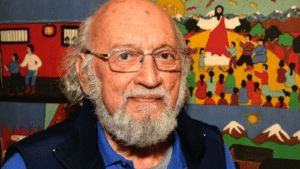Claudio González Wins Chile’s 2024 National Human Rights Award
Article originally published here en espanol
The Council of the National Institute of Human Rights valued his work in defense of memory, the search for truth and justice, reparation and measures of non-repetition for the victims of the dictatorship.
This Monday, the Council of the National Institute of Human Rights (INDH) elected Claudio González (87) as the 2024 National Human Rights Award.
The Council favored the executive director of the Foundation for Social Assistance to Christian Churches (FASIC), a Global Ministries’ partner, due to his work in defense of memory, the search for truth and justice, reparation and measures of non-repetition for victims of the dictatorship.

Aware of the news, González pointed out that “this is a recognition to all of FASIC and to all of us who have been directly involved in the different organizations. “I am just another human rights worker.”
Winner’s career
Claudio González was part of the INDH Council between 2010 and 2016, which marked the birth of the Institute, in one of the four positions chosen by the Registry of Civil Society Organizations of the INDH. Born in Concepción on October 14, 1936, he studied at the National Institute, where in 1955 he received the Silva Piderit Award for Best Institute. In 1960 he started working at Fundación Mi Casa, opening a house in Valdivia and developing his activity in Temuco and Santiago.
In 1973, a few days after the coup, he began working at the National Committee for Aid to Refugees (CONAR). That same year he obtained his title as professor of Philosophy. CONAR was one of the first instances of the Christian churches to protect people persecuted by the dictatorship after the breakdown of democracy. Claudio González thus joined the team led by Lutheran bishop Helmut Frenz.
Birth of FASIC
Then, in 1975 he became executive secretary of FASIC, whose first task was to work for people who, by virtue of Decree 504 of the dictatorship, had sentences handed down by military courts commuted for estrangement. The first FASIC team was made up of five people, including Claudio González.
In the following years, his articulation capacity extended to other areas of victim support. The program launched in 1977 for mental health stands out here, to house tortured people, as well as relatives of missing, executed and former detainees. González knew directly the reality of the prisoner centers, because he had permission to enter the Tres Álamos facility.
During the 1980s he toured Chile learning about the situation of the people who were relegated by the dictatorship. He also traveled outside the country looking for places of refuge for those suffering from exile, opening the route of international solidarity.
Work since 1990
Once democracy was recovered, González’s work extended to new areas. FASIC became the organization that supported human rights organizations once the Vicariate of Solidarity closed. This work was also replicated as a plaintiff in cases of crimes perpetrated by agents of the dictatorship.
The work he carried out deepening the ties between Christian churches allowed him to help generate new instances aimed at addressing demands for violated rights. This is how working with migrants and refugees is one of his priorities, creating programs to support them in Arica, Iquique, Antofagasta and Santiago.
Currently, Claudio González leads the FASIC Memory site because in 2003 the Foundation’s archive, as well as its documentation center, received recognition from UNESCO as part of the Memory of the World and World Heritage program.
